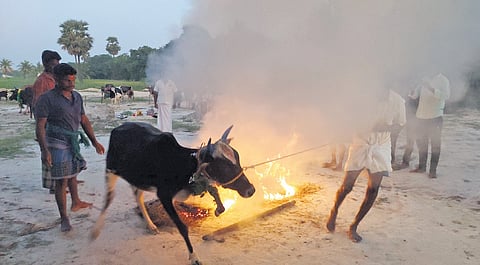

NAGAPATTINAM: Umbalacheri village, renowned as the birthplace of the native Umbalacheri breed, marked Maatu Pongal on Tuesday, albeit with a sense of concern as the number of bovines have reduced in recent years.
The celebration took place in Thalaignayiru block in the district, with cattle farmers engaged in the customary rituals of bathing, decorating, feeding Pongal to their bovines, and performing the traditional act of having the eldest animal jump over a haystack of fire.
S Vaithiyanathan, a 65-year-old farmer, said, “The numbers of Umbalacheri bovines are reducing due to the lack of availability of pastures, fodder, and an increase in farming expenses. The numbers have dropped from 2,500 to 1,500 within a year. ”
The Umbalacheri bovine belt, comprising villages such as Umbalacheri, Oradiyambalam, Vaatakaudi, Thalaignayiru, Vandal, Avarikadu, Sembiamanakudi, and Korukkai, is considered the cradle of the Umbalacheri breed.
Over 3,000 bovines, including the native breed, are raised in this region. The Umbalacherri village alone has around 1,500 bovines. Cattle-raising families, deeply rooted in traditional methods, express discontent with alternatives like ‘artificial insemination’. They believe artificially bred cattle lack height, weight, physique, and overall health. .
V Dheenadhayalan, president of the Umbalacheri Traditional Cattle Raisers Association, said, “Our village has long been the origin of the breed. Yet, the number of bovines is decreasing each year. We request the government to provide us ‘sire bulls’ of Umbalacheri breed for natural breeding.”
Umbalacheri, grappling with diminishing green pastures due to urbanisation and encroachment, has prompted bovine raisers to appeal for government assistance in securing green fodder.